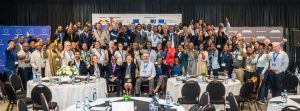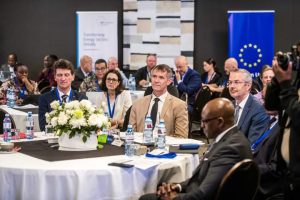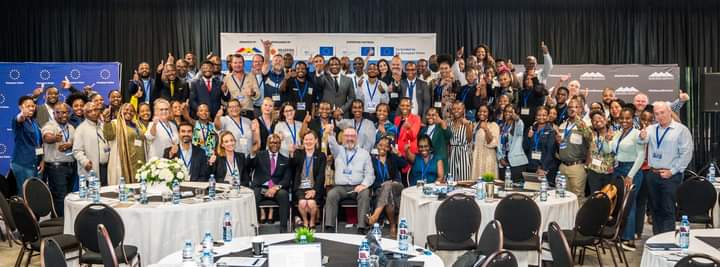By Delisa Thwala
His Majesty King Mswati III’s Government has reaffirmed its target of having 50 percent of all electricity consumed in the country generated from renewable energy sources by 2030.
This reaffirmation was made by the Director of Energy in the Ministry of Natural Resources and Energy, Thabile Nkosi, during the 3rd EU Green Power Transformation Forum 2024 held at Happy Valley last week.
Worth mentioning is that Energy security is essential for any nation’s socio-economic development. Reliable, affordable, and sustainable energy supplies power and helps maintain essential services like healthcare,
education, and public transportation, which in turn foster economic growth, help attract investments and reduce poverty.
Nkosi said in terms of policies and strategies, the government is up to date. She said the government was indeed committed to the development of renewable energy in Eswatini and making sure that the electricity generated was particularly from renewable energy sources.
The director said to reach the set target, all relevant parties should come to the party, and as a government, they were pleased to see even banks realising the importance of renewable energy and hence setting aside funds for that.
RELATED: EEC presents E930,000 CSI partnership package
“The future is bright for renewable energy. The country has managed to increase electricity access for its population from 20 percent in 2001 to over 80 percent in 2021 representing one of the biggest advances in energy access in the world. With this success, the country now faces a significant challenge:
despite possessing a rich tapestry of conventional and renewable resources, its domestic electricity generation capacity is only 76.5 megawatts, falling far short of its growing demand of 233 megawatts,” she said.
Nkosi said they have reviewed their energy master plan because the energy sector is not stagnant. She said every day, they have to come up with new strategies that will ensure that the sector is developed.
Nkosi reiterated that the government’s renewable energy aspirations are carried out in the Energy Master Plan, which provides a long-term planning roadmap for the development of new generation capacity for the country from 2018 to 2034.
The director added that the energy master plan has actually modeled different renewable energy sources, including solar, wind, and biomass, and lately will take into account the inclusion of geothermal and battery storage.

She said, as mentioned earlier, that the sector is not stagnant, hence the need to include the latest technology involved in the renewable energy space.
Nkosi added that it was also important for them to work on the renewable energy grid integration plan, ensuring that it is ready for the integration of the technological developments in the renewable energy space.
The director added that the Eswatini Electricity Company (EEC) is working on many renewable energy projects, and the regulator, the Eswatini Energy Regulatory Authority (ESERA), is also procuring from independent power producers. She said they were all informed by the master plan.
Nkosi added that they are hoping to see electricity prices coming down once the renewable energy prices are complete.
RELATED: Concerns over possible conflict of interest in EEC Chair appointment
The Energy Master Plan assesses the cost of the energy system from the deployment of various energy technologies, showing renewables to be cost-competitive in a growing array of conditions.
This is under the observed combination of expertise, purchasing power, and access to international financial markets that drives down project costs and risks of renewables deployment globally.
This master plan’s modelling output will enable the country to structure policy advice and planning for the development of renewable energy projects in a robust manner.
Worth mentioning is that Eswatini is actively working to increase domestic power generation and diversify its energy sources, with the overarching goal of ensuring energy self-sufficiency by 2030. With UNDP’s support.

“Accelerating the transition to renewable energy.
Eswatini is investing in renewable energy infrastructure and financing for new installations. Governmental initiatives,
alongside private sector investments, are focusing on harnessing Eswatini’s abundant renewable energy potential, including hydroelectricity, solar power, and biomass,” said Nkosi.
She further said the government is also actively promoting energy efficiency measures to reduce energy demand and consumption across residential, public service, industrial, and agricultural sectors.
These efforts not only aim to secure Eswatini’s energy landscape but also provide significant climate action benefits.
They align with the country’s climate pledge under the Paris Agreement, or Nationally Determined Contributions (NDC), which lays out Eswatini’s strategy to help limit the global average temperature rise to below 1.5°C.
With its NDC, Eswatini has set its first economy-wide emissions reduction target of 5 percent by 2030 compared to business as usual.
To reach this goal, the country plans to increase the share of renewable energy in the electricity mix by 50 percent before 2030 compared to 2010 levels. This will be done by increasing investments in solar, wind, hydro, and biomass energy.


